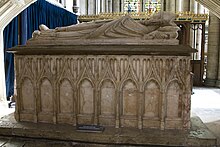Richard Mitford
| Richard Mitford | |
|---|---|
| Bishop of Salisbury | |

Tomb of Richard Mitford in Salisbury Cathedral
|
|
| Church | Catholic |
| Appointed | 25 October 1395 |
| Term ended | 3 May 1407 |
| Predecessor | John Waltham |
| Successor | Nicholas Bubwith |
| Orders | |
| Consecration | 10 April 1390 |
| Personal details | |
| Born | East Hagbourne, Berkshire |
| Died | 3 May 1407 |
| Previous post | Bishop of Chichester |
Richard Mitford (died 1407) was an English bishop of Chichester from 17 November 1389, and consecrated on 10 April 1390 and then bishop of Salisbury. He was translated to the see of Salisbury on 25 October 1395.
The earliest record of him is "Richard Medeford of Hakebourne, clerk" in 1349. The cartulary of Cirencester Abbey records the Metfords of Hakebourne (modern name East Hagbourne, Berks.) as a leading freeman tenant family of the village. His name appears as "Metford" in his own household accounts and as "Medford" in the Register of John Chandler, who was Dean of Salisbury Cathedral during much of Mitford's episcopacy. Mitford, as revealed by bequests in his own and his brother Walter's wills, had three brothers and four sisters. He spent much of his life at the royal court, starting probably as a chorister in the Chapel Royal and continuing as a clerk of the household under Edward III. His training during his time as a Fellow at Kings Hall, Cambridge from 1352-1374 prepared him for service in the royal bureaucracy, where he eventually rose to become Secretary of the King's Chamber to Richard II (1385 to 1388). He was a Canon of Windsor from 1375 - 1390.
Senior household members of Richard II were politically important, and his position gave Mitford considerable influence. He was one of the members of the royal household arrested by the "Lords Appellant" in late 1387 for treason, and was imprisoned first in Bristol Castle and then in the Tower of London. However, he was eventually released without penalty.
From 1385 to 1390 he was Archdeacon of Norfolk. In 1389, Mitford was elected to be Bishop of St David's but was rejected by the Pope.
While Bishop of Salisbury, Mitford spent much of his time at one or another of his episcopal manors, and by chance the household accounts survive of his stay at Potterne, near Devizes, for the last seven months of his life. These give day-by-day records of members of his household and his visitors, the amounts and prices of the food provided for everyday meals as well as the feasts given at Christmas, and even at his own funeral. Such details as his charitable gifts, the fee for his doctor and how much serecloth was provided for his funeral are also included.
...
Wikipedia
